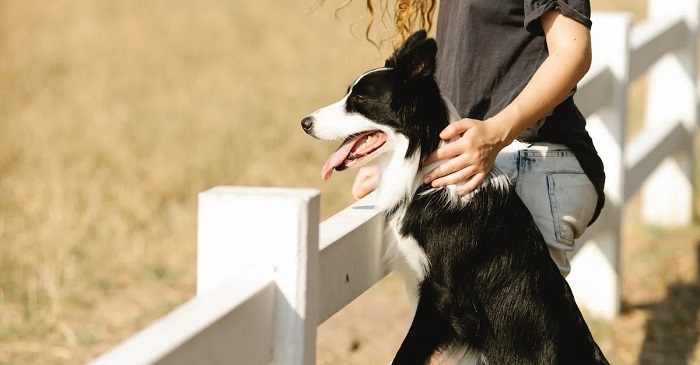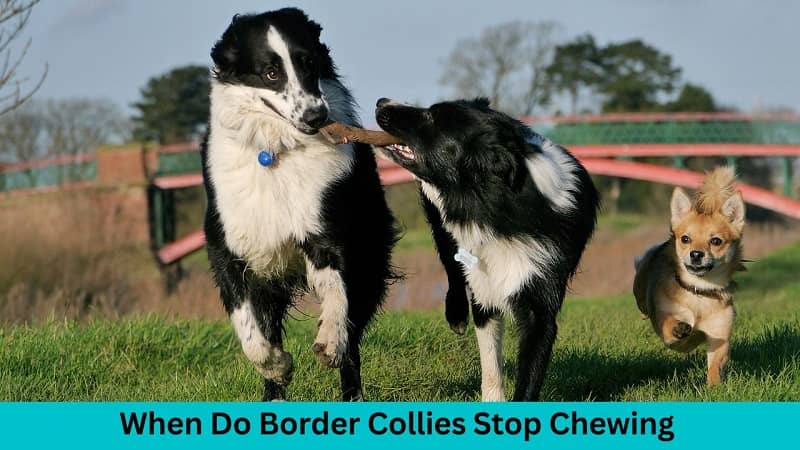If you’ve ever had the pleasure of welcoming a Border Collie into your home, you’re probably well aware. Because they have boundless energy, intelligence. And their penchant for chewing on just about anything they can sink their teeth into. When do border collies stop chewing?
Border Collies typically stop excessive chewing between 12 to 18 months of age. It may vary from dog to dog. Some Border Collies may continue to exhibit occasional chewing tendencies beyond this age. Today, I’ll explore when and how Border Collies stop chewing, and tips to maintain a chew-free home. So, let’s start!
Why Do Dogs Chew?
Chewing is a common behavior in dogs, and it serves various purposes. Here are some reasons why dogs chew:
- Anxiety or Stress
Dogs have feelings too, and just like humans, they can experience anxiety and stress. When the world gets a bit too overwhelming for them, they may resort to chewing as a way to calm their nerves. It’s their way of coping with life’s ups and downs, and it can be rather emotional to witness.
- Lack of Mental Stimulation
Imagine spending your days with nothing to do but stare at the same four walls. It would get boring, right? Dogs, especially clever ones like Border Collies, need mental stimulation to keep their brilliant minds engaged. Without it, they might turn to chewing to fend off the monotony of their daily routine.
- Insufficient Exercise or Cramped Spaces
Think about how you get on a rainy day when you can’t go outside. Dogs are not different. When they have loads of energy and nowhere to burn it, they get restless. This restlessness can manifest as chewing. Regular exercise in open spaces is vital for their physical and emotional well-being.
- Lack of Chew Toys
Dogs without proper chew toys may resort to chewing on furniture, shoes, or anything else they can find. It’s their way of trying to satisfy their natural urge to chew.
- Separation Anxiety
Dogs can feel lonely too, and this loneliness can lead to separation anxiety. Chewing becomes their companion in solitude. It provides a distraction from the emptiness they feel when their beloved humans are away. It’s a poignant reminder of the strong bond between dogs and their owners.
- Medical Issues
Sometimes, underlying medical problems can trigger excessive chewing. Dogs can’t tell us when they’re not feeling well, so they may resort to chewing as a way to cope with discomfort. It’s crucial to rule out any health issues if your dog’s chewing behavior seems unusual. This aspect is particularly emotional because it highlights the vulnerability of our loyal companions.
How Do I Get My Puppy Out of the Chewing Stage?
Let’s focus on the emotional journey of helping your Border Collie outgrow this phase:
- Make your home Puppy-Proof
Remove potential hazards or items that your dog might chew on. Creating a safe space is an act of love and care.
- Provide Dog Chew Toys
Invest in high-quality chew toys designed for puppies. These toys are not just playthings; they’re tools to soothe your pup’s need to chew. It’s like giving them a piece of your heart to nibble on.
- Use Positive Reinforcement
Think about how good it feels when someone praises and rewards you for your accomplishments. Dogs thrive on positive reinforcement. Reward your Border Collie with treats and affection when they choose to chew on their toys instead of household items. It’s a heartwarming way to strengthen your bond.
- Supervise and Redirect
Watching over your pup to keep them out of trouble. Keep a close eye on your furry friend, especially during the early stages. If you catch them in the act of chewing something they shouldn’t, calmly redirect them to an appropriate toy. Your guidance and protection mean the world to them.
- Ensure Physical and Mental Stimulation
Consider how important it is to keep your Border Collie physically and mentally engaged. These intelligent dogs need challenges and activities to keep their minds sharp. Providing opportunities for physical and mental stimulation is like giving them the keys to happiness.
How to Stop a Teething Puppy From Chewing Everything?

Border Collies go through a teething phase that can be quite challenging for both them and their owners. Here are some strategies to help you survive this emotional rollercoaster:
- Provide Appropriate Chew Toys
Imagine the relief of soothing a teething baby’s gums with a teething ring. Invest in teething-specific toys that are designed to ease your puppy’s sore gums. It’s like a warm hug for their aching mouths.
- Keep Dog Toys Easily Accessible
Think about how convenient it is to have your essentials within reach. Make sure your puppy has easy access to their toys so they can satisfy their chewing urges without resorting to your furniture. It’s a thoughtful way to make their world a bit more comfortable.
- Use Taste Deterrents
Consider using a bit of magic to protect your belongings. Apply taste deterrents to items you want to shield from your dog’s chewing habits. These products taste unpleasant to dogs and can deter them from gnawing on your cherished possessions. It’s like a protective spell for your home.
- Supervise and Redirect
Imagine being a patient teacher guiding your puppy through life’s challenges. As with adult dogs, it’s crucial to keep a close eye on teething puppies and redirect them to appropriate toys when necessary. Your gentle guidance helps them navigate the complexities of puppyhood.
- Provide Cold or Frozen Items
Think about the relief you get from a soothing ice pack when you’re in pain. Cold or frozen items like ice cubes or frozen dog toys can provide much-needed relief to teething puppies by numbing their gums. It’s a simple but effective way to ease their discomfort.
FAQs
How long does the chewing phase last in Border Collies?
The chewing phase in Border Collies typically lasts from a few months to a year, but it can vary from one dog to another. Remember, patience is key during this emotional phase.
Can I use bitter sprays as taste deterrents for chewing?
Absolutely, bitter sprays can be an emotional lifesaver for your belongings. They are often effective taste deterrents for chewing and can help protect your cherished possessions.
When do Border Collies reach maturity and become less prone to chewing?
Border Collies typically reach maturity at around 18 to 24 months of age, at which point their chewing tendencies tend to decrease. However, remember that every dog is unique, and the emotional bond you share will continue to grow.
How can I provide mental stimulation for my Border Collie?
You can provide mental stimulation for your Border Collie through some activities. Try these activities- puzzle toys, obedience training, agility training, and interactive play sessions. It’s like offering them a ticket to a world of fun and learning.
Final Thoughts
When do border collies stop chewing? It may take 12 to 18 months of age to stop chewing. Chewing is a natural behavior for dogs. So, it’s essential to provide them with acceptable outlets for this instinct. With patience, the right toys, and consistent training, you can guide your Border Collie toward a chew-free future.
If you follow these guidelines, you’ll find that your Border Collie will grow out of the chewing phase. And after following these steps continually you’ll have a happy, well-behaved companion by your side. So, enjoy the journey, and your Border Collie will be well-mannered.
